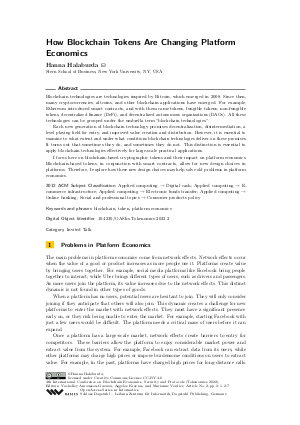How Blockchain Tokens Are Changing Platform Economics (Invited Talk)
Author Hanna Halaburda
-
Part of:
Volume:
4th International Conference on Blockchain Economics, Security and Protocols (Tokenomics 2022)
Part of: Series: Open Access Series in Informatics (OASIcs)
Part of: Conference: International Conference on Blockchain Economics, Security and Protocols (Tokenomics) - License:
 Creative Commons Attribution 4.0 International license
Creative Commons Attribution 4.0 International license
- Publication Date: 2023-07-24
File

PDF
OASIcs.Tokenomics.2022.2.pdf
- Filesize: 361 kB
- 7 pages
Document Identifiers
Subject Classification
ACM Subject Classification
- Applied computing → Digital cash
- Applied computing → E-commerce infrastructure
- Applied computing → Electronic funds transfer
- Applied computing → Online banking
- Social and professional topics → Consumer products policy
Keywords
- blockchain
- token
- platform economics
Metrics
- Access Statistics
-
Total Accesses (updated on a weekly basis)
0PDF Downloads0Metadata Views
Abstract
Blockchain technologies are technologies inspired by Bitcoin, which emerged in 2008. Since then, many cryptocurrencies, altcoins, and other blockchain applications have emerged. For example, Ethereum introduced smart contracts, and with them came tokens, fungible tokens, non-fungible tokens, decentralized finance (DeFi), and decentralized autonomous organizations (DAOs). All these technologies can be grouped under the umbrella term "blockchain technologies." Each new generation of blockchain technology promises decentralization, disintermediation, a level playing field for entry, and improved value creation and distribution. However, it is essential to examine to what extent and under what conditions blockchain technologies deliver on these promises. It turns out that sometimes they do, and sometimes they do not. This distinction is essential to apply blockchain technologies effectively for large-scale practical applications. I focus here on blockchain-based cryptographic tokens and their impact on platform economics. Blockchain-based tokens, in conjunction with smart contracts, allow for new design choices in platforms. Therefore, I explore how these new design choices may help solve old problems in platform economics.
Cite As Get BibTex
Hanna Halaburda. How Blockchain Tokens Are Changing Platform Economics (Invited Talk). In 4th International Conference on Blockchain Economics, Security and Protocols (Tokenomics 2022). Open Access Series in Informatics (OASIcs), Volume 110, pp. 2:1-2:7, Schloss Dagstuhl – Leibniz-Zentrum für Informatik (2023)
https://doi.org/10.4230/OASIcs.Tokenomics.2022.2
BibTex
@InProceedings{halaburda:OASIcs.Tokenomics.2022.2,
author = {Halaburda, Hanna},
title = {{How Blockchain Tokens Are Changing Platform Economics}},
booktitle = {4th International Conference on Blockchain Economics, Security and Protocols (Tokenomics 2022)},
pages = {2:1--2:7},
series = {Open Access Series in Informatics (OASIcs)},
ISBN = {978-3-95977-274-7},
ISSN = {2190-6807},
year = {2023},
volume = {110},
editor = {Amoussou-Guenou, Yackolley and Kiayias, Aggelos and Verdier, Marianne},
publisher = {Schloss Dagstuhl -- Leibniz-Zentrum f{\"u}r Informatik},
address = {Dagstuhl, Germany},
URL = {https://drops.dagstuhl.de/entities/document/10.4230/OASIcs.Tokenomics.2022.2},
URN = {urn:nbn:de:0030-drops-184196},
doi = {10.4230/OASIcs.Tokenomics.2022.2},
annote = {Keywords: blockchain, token, platform economics}
}
Author Details
References
- Yannis Bakos and Hanna Halaburda. Overcoming the coordination problem in new marketplaces via cryptographic tokens. Info. Sys. Research, 33(4):1368-1385, December 2022. URL: https://doi.org/10.1287/isre.2022.1157.
- Yannis Bakos and Hanna Halaburda. Will blockchains disintermediate platforms? The problem of credible decentralization in daos. SSRN, April 8, 2023. URL: https://doi.org/10.2139/ssrn.4221512.
- Bernard Caillaud and Bruno Jullien. Competing cybermediaries. European Economic Review, 45(4):797-808, 2001. 15th Annual Congress of the European Economic Association. URL: https://doi.org/10.1016/S0014-2921(01)00123-4.
- Bernard Caillaud and Bruno Jullien. Chicken & egg: Competition among intermediation service providers. The RAND Journal of Economics, 34(2):309-328, 2003. URL: http://www.jstor.org/stable/1593720.
- Michael L. Katz and Carl Shapiro. Network externalities, competition, and compatibility. The American Economic Review, 75(3):424-440, 1985. URL: http://www.jstor.org/stable/1814809.
- Jean-Charles Rochet and Jean Tirole. Platform Competition in Two-Sided Markets. Journal of the European Economic Association, 1(4):990-1029, June 2003. URL: https://doi.org/10.1162/154247603322493212.
- Jean-Charles Rochet and Jean Tirole. Two-sided markets: A progress report. The RAND Journal of Economics, 37(3):645-667, 2006. URL: http://www.jstor.org/stable/25046265.
- E Glen Weyl, Puja Ohlhaver, and Vitalik Buterin. Decentralized society: Finding web3’s soul. SSRN, May 10, 2022. URL: https://doi.org/10.2139/ssrn.4105763.
